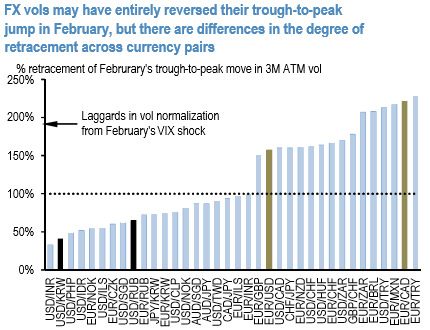The Brexit negotiations about the transition phase from March 2019 to the end of 2020 are ongoing. The negotiating partners have set a tight deadline until the end of March. That deadline might lapse without result. The foreign exchange market is currently not pricing this risk adequately. To put it another way, it currently offers very low insurance premiums for potential future pound weakness.
As the ECB edges towards normalization, an undervalued euro has room to rise further, we could foresee bullish scenarios for euro, given that the ECB changes guidance today, heralding an end to QE in Sept and hikes by 1Q’19.
The currency market currently sees only minor risks for significant GBP weakness. It expresses this view in the risk reversals, the difference in insurance premiums against significant ups versus premiums against significant downs of EURGBP. The insurance against significant upward movements of the EURGBP (i.e. significant weakening of the Pound) is hardly higher than that against significant GBP strength (refer 1st chart).
This market view is not in line with our expectations about the further negotiation process. Currently the details of the transition period (from March 2019 to end-2020) are on the table. What should the relationship between the EU and the UK look like during this period? The negotiating partners have set themselves an ambitious schedule: They want to agree on this part of the Brexit deal by the end of March. However, a situation could easily arise in which at least one side plays for time. After all, an agreement does not really have to be finalized until October in order to make the necessary technical preparations for the transition. This means that both sides will be tempted to hold on to their negotiating positions for as long as possible and let the March deadline pass if necessary. Rumor has it that both sides are preparing for this scenario. We believe it is possible that, in this case, the Pound may experience a temporary episode of weakness. The market does not see it that way.
Hedging against such circumstance seems quite cheaper: Please be noted that ATM IVs of EURGBP across all tenors are the least among G7 FX space.
2M risk reversals are trading close to zero, and 2M ATM volatility in EURGBP is still trading at quite a low level (refer 2nd chart). Undeniably, if the expiry of the March deadline would be only the result of negotiating tactics, this does not imply that a timely agreement by October will fail.
However, the failure to meet the March deadline certainly does not make an agreement more likely. On the contrary, the “risk” increases with every expired deadline. And this should at least increase the insurance premium for GBP weakness in October.
This means: the low 6-month risk reversals (refer 1st chart) and the low 6-month ATM volatility in EURGBP (refer 2nd chart) could be a quickly disappearing opportunity, which the market might correct once the March deadline has expired. In other words, even for those who only want to protect themselves against an unsuccessful expiry of the (more important) October deadline, the foreign exchange market currently offers what we consider to be an unjustifiably cheap insurance policy. Courtesy: Commerzbank
FxWirePro launches Absolute Return Managed Program. For more details, visit:



 US Gas Market Poised for Supercycle: Bernstein Analysts
US Gas Market Poised for Supercycle: Bernstein Analysts  Global Markets React to Strong U.S. Jobs Data and Rising Yields
Global Markets React to Strong U.S. Jobs Data and Rising Yields  China’s Growth Faces Structural Challenges Amid Doubts Over Data
China’s Growth Faces Structural Challenges Amid Doubts Over Data  BOJ Rate Decision in Focus as Yen Weakness and Inflation Shape Market Outlook
BOJ Rate Decision in Focus as Yen Weakness and Inflation Shape Market Outlook  Bank of Japan Signals Readiness for Near-Term Rate Hike as Inflation Nears Target
Bank of Japan Signals Readiness for Near-Term Rate Hike as Inflation Nears Target  Bank of America Posts Strong Q4 2024 Results, Shares Rise
Bank of America Posts Strong Q4 2024 Results, Shares Rise  Oil Prices Dip Slightly Amid Focus on Russian Sanctions and U.S. Inflation Data
Oil Prices Dip Slightly Amid Focus on Russian Sanctions and U.S. Inflation Data 































